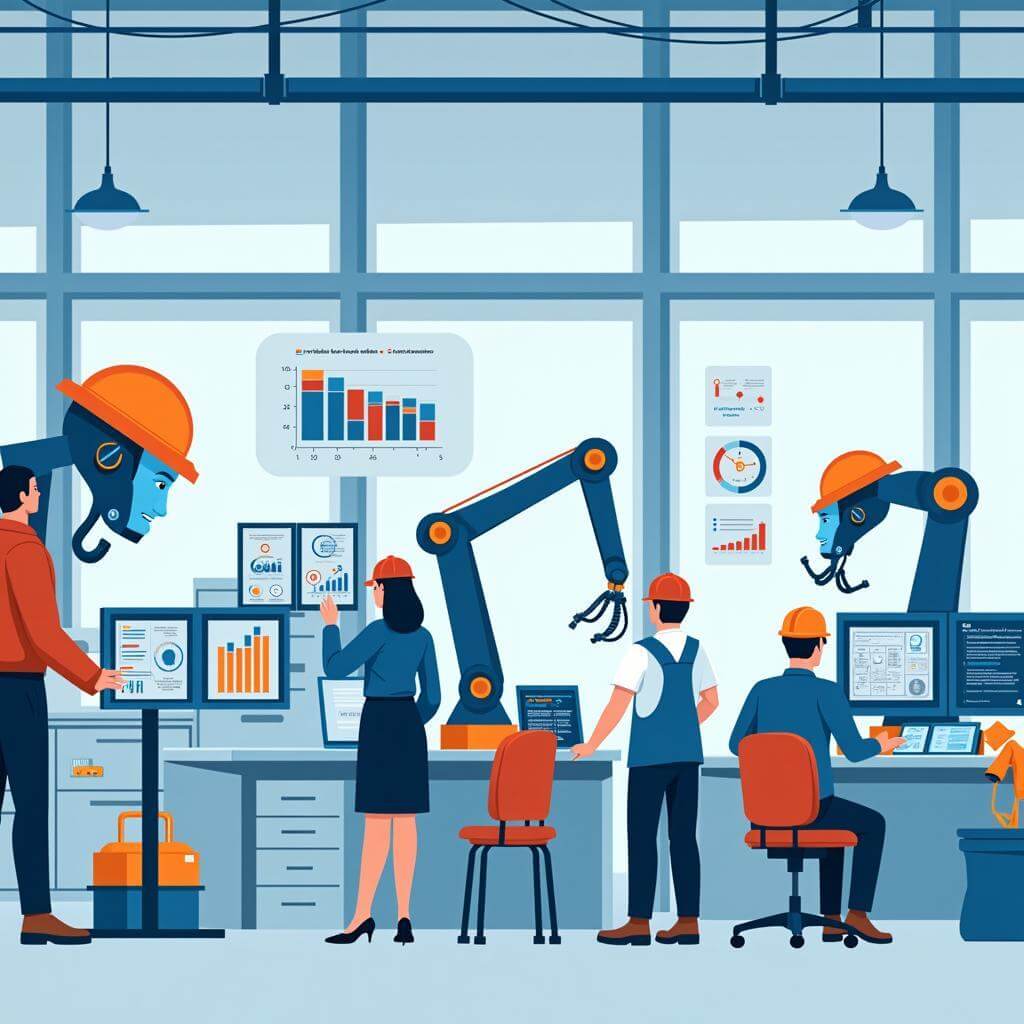The topic of automation’s impact on job availability is a recurring theme in IELTS Writing Task 2 exams. Based on recent trends and historical data from reputable IELTS resources, this subject has appeared frequently in past tests and is likely to continue as a popular topic in future exams. Given its relevance to global employment trends and technological advancements, it’s crucial for IELTS candidates to be well-prepared to address this subject.
One of the most common question types related to this topic is:
Some people believe that the development of automation and artificial intelligence will lead to widespread unemployment. Others argue that it will create new job opportunities. Discuss both views and give your opinion.
Let’s analyze this question and provide sample essays for different band scores to help you understand how to approach this topic effectively.
Question Analysis
This question is a classic example of a discussion essay with an opinion element. It requires candidates to:
- Discuss the view that automation and AI will cause widespread unemployment
- Discuss the opposing view that it will create new job opportunities
- Present their own opinion on the matter
Key points to consider:
- Balance: Ensure equal treatment of both viewpoints
- Examples: Provide relevant examples to support each argument
- Personal opinion: Clearly state your stance, preferably in the conclusion
- Structure: Use a clear essay structure with an introduction, body paragraphs, and conclusion
Now, let’s look at sample essays for different band scores.
Sample Essay 1 (Band 8-9)
The rapid advancement of automation and artificial intelligence (AI) has sparked a heated debate about its implications for the job market. While some argue that these technologies will lead to widespread unemployment, others contend that they will generate new employment opportunities. This essay will examine both perspectives before presenting my own viewpoint.
Those who fear job losses due to automation and AI have valid concerns. Many routine and repetitive tasks across various industries are already being automated, from manufacturing to customer service. For instance, self-checkout counters in supermarkets have reduced the need for cashiers, while AI-powered chatbots are increasingly handling customer inquiries in place of human representatives. As these technologies become more sophisticated, they may encroach upon jobs that were once thought to be uniquely human, such as data analysis or even creative work, potentially leading to significant unemployment across multiple sectors.
On the other hand, proponents of automation and AI argue that these technologies will create new job opportunities. Historically, technological advancements have often led to the creation of entirely new industries and job roles. The rise of the internet, for example, gave birth to careers in web development, digital marketing, and cybersecurity that were previously unimaginable. Similarly, the growth of AI and automation is likely to generate demand for roles such as AI ethicists, robotics engineers, and data scientists. Moreover, as routine tasks are automated, human workers may be freed to focus on more complex, creative, and emotionally intelligent work, potentially enhancing job satisfaction and productivity.
In my opinion, while the transition may be challenging, the development of automation and AI is more likely to transform the job market rather than cause widespread unemployment. The key lies in how societies and individuals adapt to these changes. Governments and educational institutions must prioritize reskilling and upskilling programs to prepare the workforce for future job demands. Additionally, emphasis should be placed on developing skills that are uniquely human, such as critical thinking, emotional intelligence, and creative problem-solving, which are less likely to be replicated by machines in the near future.
In conclusion, while automation and AI will undoubtedly disrupt the current job market, their impact is likely to be transformative rather than purely destructive. By anticipating these changes and adapting accordingly, societies can harness the potential of these technologies to create a more productive and fulfilling work environment for humans.
(Word count: 398)
 Automation's impact on job market transformation
Automation's impact on job market transformation
Essay Analysis (Band 8-9)
This essay demonstrates excellence in several key areas:
-
Task Achievement: The essay fully addresses all parts of the task, discussing both viewpoints and clearly presenting a personal opinion.
-
Coherence and Cohesion: The essay is well-organized with a clear structure. Each paragraph focuses on a specific point, and ideas flow logically from one to the next. Cohesive devices are used effectively throughout.
-
Lexical Resource: The essay employs a wide range of vocabulary accurately and appropriately. Complex phrases like “encroach upon jobs,” “AI ethicists,” and “emotional intelligence” demonstrate a sophisticated command of English.
-
Grammatical Range and Accuracy: The essay uses a variety of complex structures accurately. It demonstrates flexibility in sentence construction and a high degree of control over grammar and punctuation.
-
Critical Thinking: The essay shows depth of analysis, providing specific examples and considering the nuances of the issue.
-
Balanced Argument: Both viewpoints are given equal consideration before the writer’s opinion is presented.
-
Conclusion: The conclusion effectively summarizes the main points and reinforces the writer’s opinion.
This essay would likely score in the Band 8-9 range due to its sophisticated approach to the topic, excellent use of language, and clear, coherent structure.
Sample Essay 2 (Band 6-7)
The impact of automation and artificial intelligence (AI) on jobs is a topic of much debate. Some people think these technologies will cause a lot of unemployment, while others believe they will create new jobs. This essay will discuss both views and give my opinion.
On one hand, automation and AI could lead to job losses in many industries. Machines and computers can now do many tasks faster and more accurately than humans. For example, in factories, robots are replacing workers on assembly lines. In offices, software can do tasks like data entry and basic analysis. This means many people might lose their jobs, especially those doing routine or repetitive work.
On the other hand, new technologies often create new types of jobs. When computers became common, they created jobs in IT, software development, and computer repair. Similarly, AI and automation might create new jobs we haven’t thought of yet. Also, as machines take over simple tasks, humans can focus on work that needs creativity and emotional intelligence, which machines can’t do well.
In my opinion, while automation and AI will change the job market, they won’t cause widespread unemployment. However, people will need to learn new skills to adapt to these changes. Governments and companies should provide training to help workers prepare for new types of jobs. Education systems should also focus on teaching skills that machines can’t easily replace, like critical thinking and problem-solving.
How automation impacts banking employment trends can provide valuable insights into this topic, showing how technology is reshaping traditional industries.
In conclusion, automation and AI will both eliminate some jobs and create others. The key is to prepare for these changes by developing new skills and focusing on uniquely human abilities.
(Word count: 299)
 Automation and AI's impact on a diverse workforce
Automation and AI's impact on a diverse workforce
Essay Analysis (Band 6-7)
This essay demonstrates several strengths that would place it in the Band 6-7 range:
-
Task Achievement: The essay addresses all parts of the task, discussing both viewpoints and offering a personal opinion.
-
Coherence and Cohesion: The essay has a clear structure with an introduction, body paragraphs for each viewpoint, and a conclusion. Ideas are generally well-organized and connected.
-
Lexical Resource: The essay uses a mix of common and some less common vocabulary related to the topic. There’s an attempt to use more sophisticated terms like “emotional intelligence” and “critical thinking.”
-
Grammatical Range and Accuracy: The essay uses a variety of sentence structures with generally good control. There are some complex sentences, though not as consistently as in the Band 8-9 essay.
-
Examples: The essay provides some examples to support its points, which adds to its effectiveness.
-
Opinion: The writer’s opinion is clearly stated and supported with suggestions for addressing the issue.
Areas for improvement to reach a higher band score:
- More detailed examples and explanations could be provided to add depth to the arguments.
- The lexical resource could be expanded further with more sophisticated vocabulary and idiomatic expressions.
- The essay could benefit from more complex grammatical structures used consistently throughout.
- The conclusion could be more nuanced, reflecting the complexity of the issue.
Key Vocabulary
Here are some key vocabulary items from the essays, along with their definitions and parts of speech:
-
Automation (noun) /ˌɔːtəˈmeɪʃn/: The use of machines or computers to do work that was previously done by people.
-
Artificial Intelligence (AI) (noun) /ˌɑːtɪfɪʃl ɪnˈtelɪdʒəns/: The development of computer systems able to perform tasks that normally require human intelligence.
-
Encroach (verb) /ɪnˈkrəʊtʃ/: To gradually take away someone’s rights, position, etc.
-
Reskilling (noun) /riːˈskɪlɪŋ/: The process of learning new skills so you can do a different job, or of training people to do a different job.
-
Upskilling (noun) /ˈʌpskɪlɪŋ/: The process of learning new skills or of teaching workers new skills.
-
Ethicist (noun) /ˈeθɪsɪst/: An expert in or student of ethics, especially one who studies ethical issues in a particular field.
-
Transformative (adjective) /trænsˈfɔːmətɪv/: Causing a major change to something or someone, especially in a way that makes it or them better.
-
Disrupt (verb) /dɪsˈrʌpt/: To prevent something, especially a system, process, or event, from continuing as usual or as expected.
-
Adaptability (noun) /əˌdæptəˈbɪləti/: The quality of being able to adjust to new conditions or changes.
-
Cybersecurity (noun) /ˌsaɪbəsɪˈkjʊərəti/: The state of being protected against the criminal or unauthorized use of electronic data, or the measures taken to achieve this.
Conclusion
The impact of automation on job availability is a complex and evolving topic that is likely to remain relevant in IELTS Writing Task 2 exams. To prepare effectively, candidates should:
- Stay informed about current trends in automation and AI across various industries.
- Practice discussing both positive and negative impacts of technological advancements on employment.
- Develop a range of examples to support different viewpoints.
- Work on expanding vocabulary related to technology, employment, and economic change.
Impact of digital technology on banking is another related topic that candidates might find useful to explore, as it provides specific insights into how technology is changing a major industry.
For further practice, try writing your own essay on this topic or related ones, such as:
- The role of governments in managing job market changes due to automation
- The impact of AI on specific industries like healthcare or education
- The ethical implications of replacing human workers with machines
Remember to post your practice essays in the comments section for feedback and discussion. This active engagement will help you refine your writing skills and prepare more effectively for the IELTS Writing Task 2.


